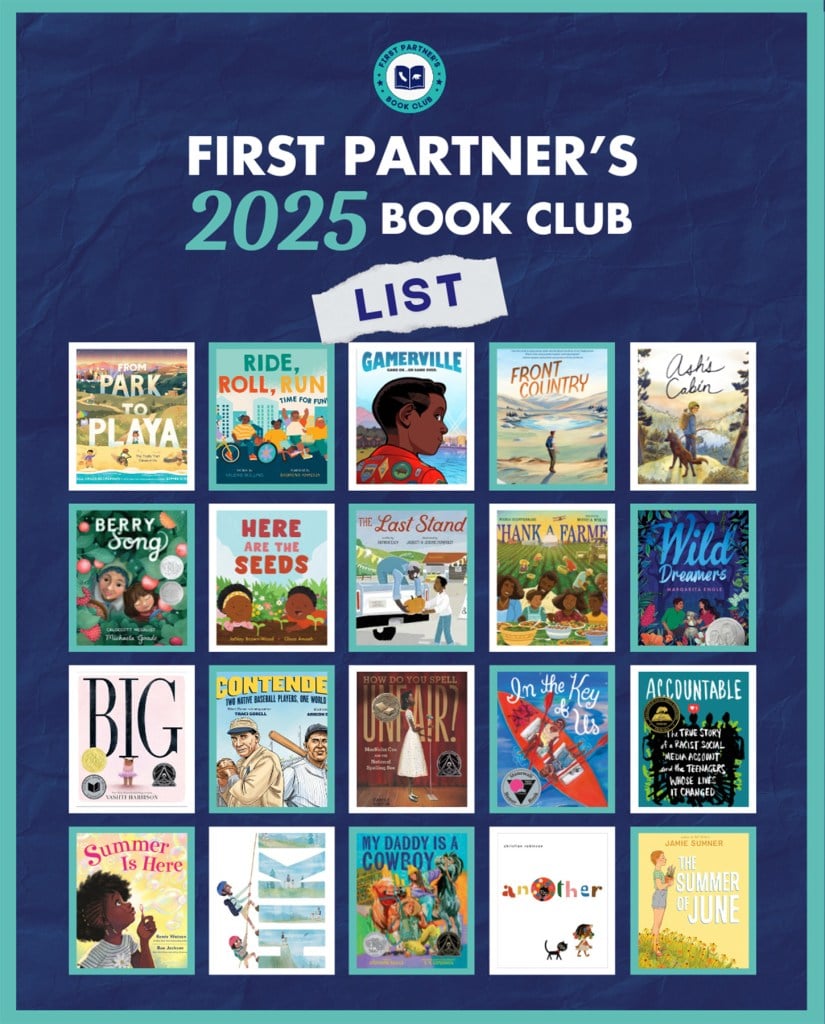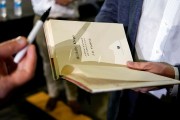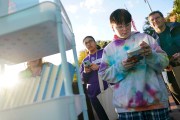Jennifer Siebel Newsom, first partner of California, doesn’t mince words: “When so many things that support working families, children and older adults are being ripped away by this administration in order to help offset billionaire tax cuts, it is our duty to raise up and support these critical public resources.”
It’s a fiery critique of Washington’s priorities — one that has led her to expand the annual summer book club she began four years ago. The club includes a recommended list of children’s books available at nearly 900 libraries statewide and support for library programs to attract more youth. On occasion, Siebel Newsom and local authors appear at book club events, such as in June, when they dropped by the Altadena Library after the establishment revived its summer reading program following the catastrophic Eaton Fire in January. For the first time, Siebel Newsom’s book club will take place all year long, she announced recently.
Book clubs are critical interventions against “the summer slide” — the brain drain that hits kids when school’s out, causing them to lose months of academic skills and scramble to catch up come fall. Amid what experts describe as a nationwide children’s literacy crisis, Siebel Newsom’s club, formed in collaboration with the California State Library, urges young people to disconnect from the internet and enter the “third space” that is the library — one where they encounter community members from all walks of life.
But there’s one problem: Libraries themselves are under siege. The Trump administration gutted federal funding for libraries this spring in a broader attack on public institutions wrapped up with efforts to purge diversity, equity and inclusion from public life.
“At a time when beloved, long-standing public institutions, like our libraries and our parks, are being outright attacked by the administration in D.C., we’re working hard in California to uplift and protect them,” Siebel Newsom said.
None of the 20 titles in Siebel Newsom’s book club has faced censorship — yet. Their themes, however, include positive girl representation, environmental leadership and youth mental health, all of which have been fodder for the culture wars that have played out in the nation’s classrooms.
There’s author Jen Wang’s “Ash’s Cabin,” a book for high school students about a youth’s fight against climate change. Also on the list is JaNay Brown-Wood’s “Here are the Seeds,” about children learning that planting a garden rarely goes as planned. Aphids, anyone?
In addition to her book club and the Trump’s administration’s attacks against libraries, Siebel Newsom spoke to The 19th about how to respond when kids struggle to read, toxic internet culture and the fact that her governor husband is also a children’s book author.
This interview has been edited for length and clarity.
Nadra Nittle: Why was it important for you to launch this book club?
Jennifer Siebel Newsom: I started the book club in 2021 to help get more kids and families reading and in our public libraries, especially over the summer. Studies show that students who participate in summer reading programs have improved educational outcomes, and in fact, early literacy is linked to success throughout life — from academics, to earning power, to mental and physical health. And now, more than ever, books offer our kids a much-needed mental health break from the often toxic online world.
This year, we’re expanding the summer book club into a year-round program to encourage kids and families to read more and visit our public libraries year round. In addition to a list of incredible reads for preschool through high school-aged kids, the book club includes investments in library programs that help get more families into libraries — volunteer projects in library gardens, digital storytelling workshops and even library lunches.
-
Read Next:
The nation’s children are reportedly experiencing a literacy crisis. How does your book club address it?
Helping connect children to great reads available for free check-out and helping get more families into our amazing libraries is a small step to help address a much larger problem around early literacy. Between 2011-2022, California had one of the largest gains in fourth-grade reading levels. However, the state has more work to do to ensure that all kids, no matter their ZIP code, have a chance to read and thrive.
This June, the governor announced the Golden State Literacy Plan, outlining new investments to boost student reading achievement. In California, we’ve made big investments in education: after-school and summer school programs, free universal transitional kindergarten so all 4-year-olds can start school, and universal school meals, ensuring all kids get at least two meals a day — including through the Farm to School initiative, which ensures that healthier and locally sourced real foods are getting to nearly 50 percent of our schools statewide.
Gov. Gavin Newsom wrote a 2021 children’s book that draws on his experience with dyslexia, “Ben and Emma’s Big Hit.” He’s also said that two of your children have fallen behind in reading previously. Any advice for families navigating similar issues?
Yes, absolutely: Read to your children every night and as often as you can and cultivate a love of books and stories. Also, notice if they are struggling at all and get them screened early, as early literacy is such a critical component in educational success and success throughout the span of a life. I am so proud that thanks in large part to my husband’s work and advocacy on this issue, as of this year, California is ensuring that all kindergarten, first and second grade students are annually screened in school for reading difficulties, including dyslexia.
-
Read Next:
How do the titles chosen for the book club this year stand out?
Well, for starters, librarians across California helped curate the list, and they really are experts on what books are irresistible to kids of all ages. This year’s list also centers around themes of positive role models for girls, environmental stewardship and kids’ mental health. Those issues are close to my own heart, too, as someone whose work has focused so much on women and girls empowerment, improving our climate and food supply through initiatives, and building family and children’s mental health resilience.
For example, “In the Key of Us,” by Mariama J. Lockington, is aimed at middle schoolers and follows 13-year-old Andi’s journey as one of the few Black girls in a sea of White faces at music camp. It is just a beautiful coming-of-age story about belonging and the friendships that heal us, following the loss of loved ones early in life. It’s also a love letter to music! Another wonderful book for high schoolers struggling with the fears and frustrations of climate change is “Ash’s Cabin,” which follows one teen’s attempt to right the wrongs of climate destruction by building a secret cabin in the wilderness of California.

How have federal cuts affected funding for California’s libraries, and what has the state done in response?
Sadly, we live in a time when public resources we all used to agree on — our libraries, our beautiful state parks — are under attack from the administration in D.C. California’s federal Institute of Museum and Library Services (IMLS) grant for library funding was slashed entirely this spring by the Trump administration. Through legal challenges, however, some — though not all — of the funding has been restored. California is helping to protect our libraries and parks in our budget, including by helping make these public treasures more accessible to all.
The books on your club’s list haven’t faced censorship, though some California school boards have made attempts to ban books in recent years. How has Gov. Newsom addressed these efforts?
I think we can look at history and see that civilizations and governments that banned books were never headed in the right direction. If anything, now more than ever, we need more access to books and more educational freedom. And children, in particular, need to see the world in all of its colors and learn tolerance and how different perspectives and kinds of people make up a shared common humanity.
In California, the governor signed legislation in 2023 that prevents “book bans” in schools, censorship of instructional materials and strengthens California law requiring schools to provide all students access to textbooks that teach about California’s diverse communities.
-
Read Next:
You mentioned books offering a “mental health break” from the toxic internet. I recently wrote about the manosphere’s influence on youth. Do you have any thoughts about this?
So many thoughts! It is a continuing focus for my film work. [Siebel Newsom is a documentary filmmaker.] And looking back on my own childhood, diving into books and the comfort of our public library almost certainly served as “alternative programming” for a girl coming of age in the largely sexist media culture of the time. The misogynistic pre-internet culture I was trying to escape from as a kid seems almost quaint compared to what kids face today. But this is why I think that the act of reading — and access to libraries — may be even more critical for young people today than it has ever been.
Books spur a lifelong curiosity about others and the world and systems one is born into. They can offer a different perspective and show one the strength of the human spirit to rise above and carve out one’s own unique voice. The books I read as a kid created a lifelong love of the transformative power of storytelling, which has fueled me throughout my career in filmmaking and advocacy.
What was your favorite childhood book, and do you think it would still resonate with kids today?
“The Little House” series was the earliest one that had an outsized impact on me, especially with the stories so grounded in a young girl’s perspective. I do think they are still wonderful and relevant and know that today they are taught with historical context and to encourage critical thinking too, so that kids can understand the full picture of that moment in our history.
Great Job Nadra Nittle & the Team @ The 19th Source link for sharing this story.







